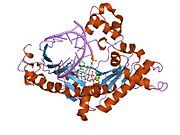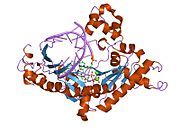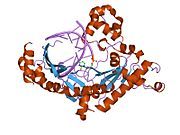POLI
DNA polymerase iota is an enzyme that in humans is encoded by the POLI gene.[4] It is found in higher eukaryotes, and is believed to have arisen from a gene duplication from Pol η. Pol ι, is a Y family polymerase that is involved in translesion synthesis. It can bypass 6-4 pyrimidine adducts and abasic sites and has a high frequency of wrong base incorporation. Like many other Y family polymerases Pol ι, has low processivity, a large DNA binding pocket and doesn't undergo conformational changes when DNA binds. These attributes are what allow Pol ι to carry out its task as a translesion polymerase. Pol ι only uses Hoogsteen base pairing, during DNA synthesis, it will add adenine opposite to thymine in the syn conformation and can add both cytosine and thymine in the anti conformation across guanine, which it flips to the syn conformation.
Xeroderma pigmentosum variant
[edit]Xeroderma pigmentosum variant (XPV) cells lack DNA polymerase eta (η).[5] Instead these cells use DNA polymerase iota (ι).[5] Exposure of XPV cells to UV light causes a very high frequency and unique spectrum of UV-induced mutations that can ultimately lead to malignant transformation.[5]
References
[edit]- ^ a b c GRCm38: Ensembl release 89: ENSMUSG00000038425 – Ensembl, May 2017
- ^ "Human PubMed Reference:". National Center for Biotechnology Information, U.S. National Library of Medicine.
- ^ "Mouse PubMed Reference:". National Center for Biotechnology Information, U.S. National Library of Medicine.
- ^ Frank EG, Woodgate R (Aug 2007). "Increased catalytic activity and altered fidelity of human DNA polymerase iota in the presence of manganese". J Biol Chem. 282 (34): 24689–96. doi:10.1074/jbc.M702159200. PMID 17609217.
- ^ a b c Wang Y, Woodgate R, McManus TP, Mead S, McCormick JJ, Maher VM. Evidence that in xeroderma pigmentosum variant cells, which lack DNA polymerase eta, DNA polymerase iota causes the very high frequency and unique spectrum of UV-induced mutations. Cancer Res. 2007 Apr 1;67(7):3018-26. doi: 10.1158/0008-5472.CAN-06-3073. PMID: 17409408
Further reading
[edit]- McIntyre J (2020). "Polymerase iota - an odd sibling among Y family polymerases". DNA Repair. 86 (102753): 102753. doi:10.1016/j.dnarep.2019.102753. PMID 31805501.
- McDonald JP, Tissier A, Frank EG, et al. (2001). "DNA polymerase iota and related rad30-like enzymes". Philos. Trans. R. Soc. Lond. B Biol. Sci. 356 (1405): 53–60. doi:10.1098/rstb.2000.0748. PMC 1087691. PMID 11205331.
- Tissier A, Frank EG, McDonald JP, et al. (2001). "Biochemical characterization of human DNA polymerase iota provides clues to its biological function". Biochem. Soc. Trans. 29 (Pt 2): 183–7. doi:10.1042/BST0290183. PMID 11356150.
- McDonald JP, Rapić-Otrin V, Epstein JA, et al. (1999). "Novel human and mouse homologs of Saccharomyces cerevisiae DNA polymerase eta". Genomics. 60 (1): 20–30. doi:10.1006/geno.1999.5906. PMID 10458907.
- Masutani C, Kusumoto R, Iwai S, Hanaoka F (2000). "Mechanisms of accurate translesion synthesis by human DNA polymerase eta". EMBO J. 19 (12): 3100–9. doi:10.1093/emboj/19.12.3100. PMC 203367. PMID 10856253.
- Tissier A, McDonald JP, Frank EG, Woodgate R (2000). "poliota, a remarkably error-prone human DNA polymerase". Genes Dev. 14 (13): 1642–50. doi:10.1101/gad.14.13.1642. PMC 316739. PMID 10887158.
- Tissier A, Frank EG, McDonald JP, et al. (2000). "Misinsertion and bypass of thymine-thymine dimers by human DNA polymerase iota". EMBO J. 19 (19): 5259–66. doi:10.1093/emboj/19.19.5259. PMC 302107. PMID 11013228.
- Hartley JL, Temple GF, Brasch MA (2001). "DNA cloning using in vitro site-specific recombination". Genome Res. 10 (11): 1788–95. doi:10.1101/gr.143000. PMC 310948. PMID 11076863.
- Wiemann S, Weil B, Wellenreuther R, et al. (2001). "Toward a catalog of human genes and proteins: sequencing and analysis of 500 novel complete protein coding human cDNAs". Genome Res. 11 (3): 422–35. doi:10.1101/gr.GR1547R. PMC 311072. PMID 11230166.
- Bebenek K, Tissier A, Frank EG, et al. (2001). "5'-Deoxyribose phosphate lyase activity of human DNA polymerase iota in vitro". Science. 291 (5511): 2156–9. Bibcode:2001Sci...291.2156B. doi:10.1126/science.1058386. PMID 11251121. S2CID 83716303.
- Simpson JC, Wellenreuther R, Poustka A, et al. (2001). "Systematic subcellular localization of novel proteins identified by large-scale cDNA sequencing". EMBO Rep. 1 (3): 287–92. doi:10.1093/embo-reports/kvd058. PMC 1083732. PMID 11256614.
- Frank EG, Tissier A, McDonald JP, et al. (2001). "Altered nucleotide misinsertion fidelity associated with poliota-dependent replication at the end of a DNA template". EMBO J. 20 (11): 2914–22. doi:10.1093/emboj/20.11.2914. PMC 125476. PMID 11387224.
- Vaisman A, Tissier A, Frank EG, et al. (2001). "Human DNA polymerase iota promiscuous mismatch extension". J. Biol. Chem. 276 (33): 30615–22. doi:10.1074/jbc.M102694200. PMID 11402031.
- Ohmori H, Friedberg EC, Fuchs RP, et al. (2001). "The Y-family of DNA polymerases". Mol. Cell. 8 (1): 7–8. doi:10.1016/S1097-2765(01)00278-7. PMID 11515498.
- Vaisman A, Woodgate R (2002). "Unique misinsertion specificity of poliota may decrease the mutagenic potential of deaminated cytosines". EMBO J. 20 (22): 6520–9. doi:10.1093/emboj/20.22.6520. PMC 125734. PMID 11707422.
- Faili A, Aoufouchi S, Flatter E, et al. (2002). "Induction of somatic hypermutation in immunoglobulin genes is dependent on DNA polymerase iota". Nature. 419 (6910): 944–7. Bibcode:2002Natur.419..944F. doi:10.1038/nature01117. PMID 12410315. S2CID 4431410.
- Kannouche P, Fernández de Henestrosa AR, Coull B, et al. (2003). "Localization of DNA polymerases eta and iota to the replication machinery is tightly co-ordinated in human cells". EMBO J. 21 (22): 6246–56. doi:10.1093/emboj/cdf618. PMC 137208. PMID 12426396.
- Frank EG, Sayer JM, Kroth H, et al. (2002). "Translesion replication of benzo[a]pyrene and benzo[c]phenanthrene diol epoxide adducts of deoxyadenosine and deoxyguanosine by human DNA polymerase iota". Nucleic Acids Res. 30 (23): 5284–92. doi:10.1093/nar/gkf643. PMC 137958. PMID 12466554.
- Strausberg RL, Feingold EA, Grouse LH, et al. (2003). "Generation and initial analysis of more than 15,000 full-length human and mouse cDNA sequences". Proc. Natl. Acad. Sci. U.S.A. 99 (26): 16899–903. Bibcode:2002PNAS...9916899M. doi:10.1073/pnas.242603899. PMC 139241. PMID 12477932.












